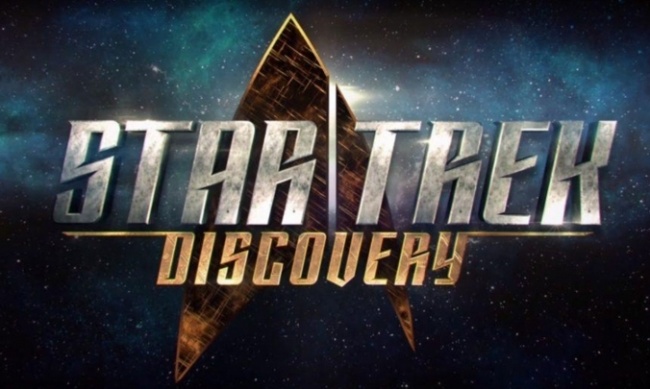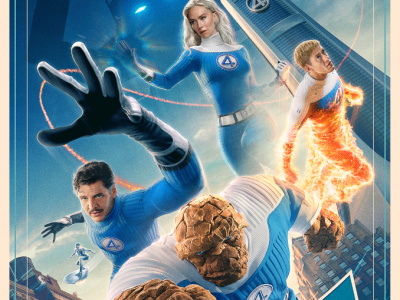Confessions of a Comic Book Guy is a weekly column by Steve Bennett of Super-Fly Comics and Games in Yellow Springs, Ohio. This week, Bennett explores the frontiers of the new Star Trek series.
As previously established (see “Confessions of a Comic Book Guy--Christmas In September”), I’ve never been what you’d call a major Star Wars fan, primarily due to the fact I was a little too old when A New Hope came out. But Star Trek, demographically speaking, that was much more in my wheelhouse. Because like a lot of people of my generation, growing up I was obsessed with space travel. For those younger than myself, it’s important to stress I am not talking about science fiction, though that was cool too, but science fact. By which I mean The Space Race, the US Government Space Program, NASA.
I’m talking about Kennedy’s Dream, which many forget wasn’t just to land a man on the moon but to send Americans “to the moon and the planets beyond”. Back during the 1950s science fiction boom kids stopped seeing cowboys as role models and embraced the “Spaceman.” But this was different, Astronauts were real and becoming one was an actual achievable career choice. And while the dream was heavily marketed to them for purely commercial purposes*, it was also in hopes that at least some of them would grow up wanting to be the scientists needed to help make that dream a reality.
And for us Star Trek was the embodiment of that dream. So I’ve been following with semi-keen interest the news there was going to be another Star Trek TV series, Star Trek: Discovery. But the really cool thing about this Star Trek, for guys like me anyway, was it was going to be shown the way I saw the show originally: on prime-time network television.
But every new announcement about the show made me feel less and less enthused about it. First screenwriter and television producer Bryan Fuller pulled out as series showrunner, then the premiere was pushed back from “early 2017” to May. Then came word that while the pilot would premiere on CBS the series itself was going to be relegated to CBS All Access, their SVOD (Streaming Video On Demand) online digital platform. A move which struck me as being an ill-conceived, faintly desperate attempt to try and monetize the network's’ extensive library of shows.
It was bad enough that they would be asking Star Trek fans to pay $6 a month ($10 without commercials) for the privilege of watching a single series (because while other CBS shows are included it’s hard to imagine most fans having any interest in watching either the classic or contemporary version of Hawaii 5-0). But making it worse was the announcement that Star Trek: Discovery would be running on Netflix in 188 countries around the world.
Then I saw the headline “Despite Current Glut of Successful Scifi Shows, CBS Executive Says New Star Trek Wouldn't Work on TV” on the i09 website. Apparently during an interview on the podcast Recode Media With Peter Kafka, CBS Interactive CEO Jim Lanzone offended a lot of Star Trek fans by saying, “Sci-fi is not something that has traditionally done really well on broadcast. It’s not impossible, for the future, if somebody figures it out. But historically, a show like ‘Star Trek’ wouldn’t necessarily be a broadcast show, at this point.”
The only thing is, he’s not wrong. The truth is, while science fiction (and fantasy) shows have recently done pretty well on basic and pay cable, historically they haven’t done so well on network television. And they’re a particularly bad fit for CBS’s older viewership, which is why Supergirl got transferred from CBS to the CW, where it probably should have been in the first place.
I know I’m just an armchair entertainment enthusiast, but chances are if Star Trek: Discovery did run on CBS the pilot episode would get record ratings, each successive episode would do slightly worse until the network would be faced with the prospect of cancelling it. Which wouldn’t be good for the brand.
The other thing that came out of this interview was the news the online Star Trek: Discovery would include “mature language” and nudity (see “’Star Trek: Discovery’ May Boldly Embrace Nudity, Profanity”), which doesn’t sound so much like Star Trek as it does Westworld and Games of Thrones. Which I’m guessing is no way a coincidence; those shows are doing exceptionally well, have faithful fan bases and get rave reviews. So why not use them as the very model of what a modern Star Trek series should be? I can’t think of a “better” way of boldly announcing “This isn’t your Grandpa’s Star Trek.”
*Of course in the vocabulary of the under twelve crowd the terms “Spaceman” and “Astronaut” were interchangeable, the way “soldier” and “army guy” were. Which is why, I suppose, there was both a Dell comic book and a black and white Warren magazine named Spaceman. Astronauts were on TV sitcoms (I Dream of Jeannie, It’s About Space). On the fun food front there was Tang and Space Food Sticks, though as we’ve recently learned, sadly, the legendary “astronaut ice cream” never actually made it into space. In toys G.I. Joe had a space suit as well as a space capsule as an accessory, and Major Matt Mason was an action figure astronaut who lived and worked on the moon. Even the ads for bodybuilding programs that appeared in comic books got onboard, Photographs of muscle men promised to instill “Spaceman strength and endurance” into perspective applications or begged to “Let me show YOU how to make yourself Astronaut Tough.”
The opinions expressed in this column are solely those of the writer, and do not necessarily reflect the views of the editorial staff of ICv2.com.








